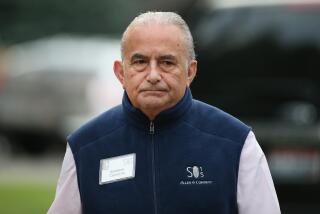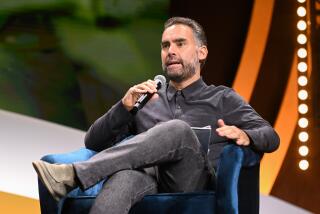Venezuela’s last major opposition TV station is sold
- Share via
CARACAS, Venezuela — The sale of Globovision, Venezuela’s last major television station critical of the government, raised concern Tuesday that no mass media platform may remain on which to challenge the Chavista administration of President Nicolas Maduro.
The sale of the station for an undisclosed price by an ownership group led by Guillermo Zuloaga, now self-exiled in Miami, was completed Monday night, according to a statement the broadcaster posted on its website. Zuloaga had said mounting government fines and political harassment had left him with no choice but to sell.
The new owners — Raul Gorrin, Juan Domingo Cordero and Gustavo Perdomo — are businessmen said to have ties to the government of Maduro, who was elected April 14 to serve out the term of former President Hugo Chavez, who died of cancer March 5. The sale has come as soaring inflation, violent crime and a sour economy have provoked a rising chorus of citizen complaints.
“Globovision is the only critical broadcaster still on the air,” said Carlos Lauria, senior program coordinator at New York-based Committee to Protect Journalists. “If the network changes its editorial line, tones down its criticism and aligns with the government, this will affect the freedom of expression landscape by undermining pluralism for all Venezuelans.”
Since June 2007, when another station, RCTV, was denied renewal of its broadcast license and subsequently went dark, Globovision has been the only major station with antigovernment editorial views. The government, meanwhile, started six TV stations and took over as many as 300 community radio stations after Chavez came to power in 1999.
“In the world of radio and television, this sale leaves the opposition with no space,” said Marcelino Bisbal, a media professor at Andres Bello Catholic University in Caracas, the capital. He said the new owners are aware that Globovision’s license comes up for renewal in 2015 and that a pro-government editorial stance is crucial for approval.
The government’s denial of RCTV’s license renewal prompted massive free speech demonstrations and the emergence of an anti-Chavez youth movement that cost the late president political capital at home and abroad. Globovision, whose signal extends only across Caracas and nearby Valencia, doesn’t have the reach that RCTV had.
“The sale is a clear signal of the hard times for freedom of expression in Venezuela,” said Andres Canizalez, a media expert and professor at Andres Bello. “Chavismo succeeded in bending Globovision to its will in an indirect way that avoided the political cost of the RCTV closure.”
Canizalez said a bad sign for those who still hope the station will retain its independence was the last-minute refusal of former Ambassador Vladimir Villegas, a Chavista turned moderate critic, to take over as news director for the new owners.
“Differences with the new management” were to blame, Villegas, the brother of Information Minister Ernesto Villegas, said on social media. “There was no consensus on programming or what my responsibilities were.”
International press freedom advocates consistently criticized Chavez’s harassment of opposition media and were quick to denounce the sale Tuesday. Lauria said the sale could mean that “critical voices and dissent will suffer a blow.”
Globovision struggled to pay a multimillion-dollar fine levied by the government in 2011 for “inciting violence” during its live broadcasts of a prison riot in which dozens of prisoners died, one of nine such actions to penalize the station in recent years. Prisons were a sensitive topic for the Chavez government, which was criticized for having one of the hemisphere’s most dangerous penal systems.
But Zuloaga said the station’s fate was sealed in February when the government issued compulsory digital transmission standards that in effect meant Globovision’s analog broadcast equipment would become obsolete. Sale negotiations began shortly afterward.
Zuloaga, who also owned car dealerships, fled to Miami in 2010 after the government accused him of illegally keeping vehicles off the market in violation of anti-hoarding laws. The station owner said the charges were political harassment.
Leopoldo Castillo, host of Globovision’s popular “Alo Ciudadano” call-in show, told interviewers that he would stay on board only for three months and that he expected the editorial policy to gradually “move to the center” from a pointedly anti-Chavista stance.
“The Globovision we have known for the last 12 years is no more,” Castillo said. “I want to make things clear. [To say] anything else would be dishonest.”
Special correspondents Kraul reported from Bogota, Colombia, and Mogollon from Caracas.
More to Read
Sign up for Essential California
The most important California stories and recommendations in your inbox every morning.
You may occasionally receive promotional content from the Los Angeles Times.










